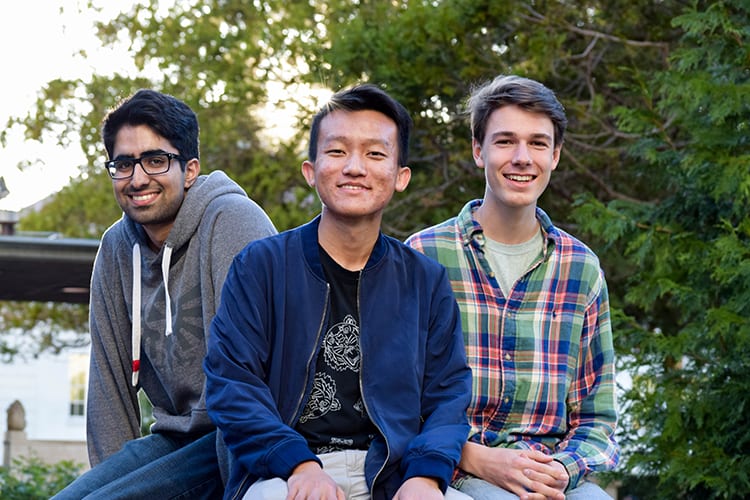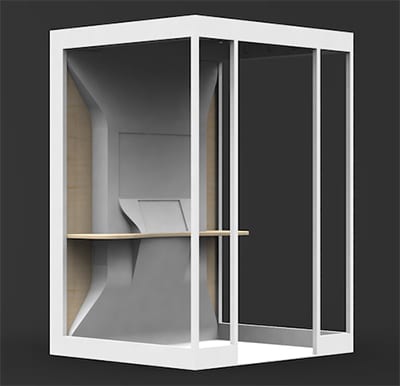
During a trip to China last year, Luofei Chen arrived at the airport a few hours early. Spying a soundproof karaoke booth, he decided to pop in and kill some time singing.
“I thought I’d spend 15 minutes in it. I ended up using it for an hour and a half. I think I was the last person to get on the plane,” says Chen, a freshman in the rigorous Management, Entrepreneurship and Technology (M.E.T.) program, which awards students two undergraduate degrees—one from Berkeley Haas and one from Berkeley Engineering—in four years.
Chen, who has always enjoyed karaoke with friends, says he got hooked on the fun of singing by himself. The karaoke booth, he adds, felt “like singing in the shower, but with better equipment.”
So, when he got back to the United States, he huddled with his roommate Noah Adriany, a first-year architecture major at Berkeley who also loves karaoke, and the two decided to find a way to bring soundproof karaoke pods, already popular across Asia, to U.S. airports and shopping malls.
Six months later, their startup, Oki Karaoke, is manufacturing its first karaoke booth, and it’s on track to arrive in California from China in May. This summer, the students will pilot test the booth in the Westfield San Francisco Centre in downtown San Francisco.
Dorm development
Their mission began in their Unit 2 residence hall, where Chen and Adriany invested their own money, about $1,000, to build a rudimentary prototype — an open karaoke booth equipped with a computer tablet and a video screen that plays music videos. They spent more than 40 hours a week for two weeks creating it in a makerspace in the campus’s Jacobs Institute for Design Innovation. Then, they installed the pod in their dorm’s lounge and used it to do research on the residents

“People really responded to being spontaneous and singing whenever they wanted to,” Adriany says. “We tracked up to 1.5 hours of singing every day with the 18-to-25-year-old age group during the two months we had the prototype installed.”
After the team took down the prototype in February, they moved forward with a plan to design Oki Karaoke’s first commercial soundproof karaoke booth. The 8-foot-tall booth, roomy enough for a maximum of four people, will have privacy options, such as curtains, for singers and will feature a video screen and a library of more than 1,000 English-language songs. Customers will be charged by the minute; further pricing details are in the works.
“Our target customers range from solo singers to a few friends to couples hanging out in the mall,” says Chen, who speaks Mandarin, prefers pop tunes and wants to add songs in Chinese to the library soon.
Mentors move it forward
Mentors, along with $5,000 in seed funding from Haas’ Trione Student Venture Fund, are helping to move Oki Karaoke forward.
Stephen Torres, a Berkeley Engineering lecturer who teaches in the M.E.T. program, helped the founders develop their idea. Torres then introduced them to alumni Kai Huang, who earned a B.A. in computer science in 1994, and his brother, Charles, who graduated in 1993 with a B.A. in both economics and Asian studies. The pair co-created the blockbuster Guitar Hero games.
“They’ve gone through a lot of the same things we’re going through now with everything from licensing to manufacturing, and they’re helping us to build our company,” Chen says.
Help from Berkeley LAUNCH
The team, which now includes a third co-founder, Aayush Tyagi, a Berkeley junior majoring in electrical engineering and computer science, is currently participating in Berkeley LAUNCH, the UC-wide startup accelerator and competition designed to transform early-stage startups into fundable companies.
Rhonda Shrader, executive director of the Berkeley Haas Entrepreneurship Program and who serves on the LAUNCH faculty, said business models like Oki Karaoke’s don’t automatically translate from one part of the world — like China, where solo karaoke booths are in wide use — to another.
“Applying the skills they’ve learned in the LAUNCH accelerator can help them mitigate the risk and get to success more quickly,” Shrader says.
Oki Karaoke’s founders plan to stay in Berkeley this summer to work on the business and participate in Real Startup, a Bay Area entrepreneurship program that works with companies like Google, Warner Music Group and Apple to mentor students interested in music, media or entertainment technology.
With their first booth on its way, the founders are looking forward to getting customer feedback. “If we can prove that our pod works and that people love it, then we can possibly get the money to build 10, 20 or 40 more booths,” Chen says.
He adds that he’s excited to get the Oki Karaoke booth rolled out for altruistic reasons, too.
“Singing is a way to happiness,” Chen says. “It’s a very easy way to have fun.”
NOTE: Antoinette Siu contributed to this article.